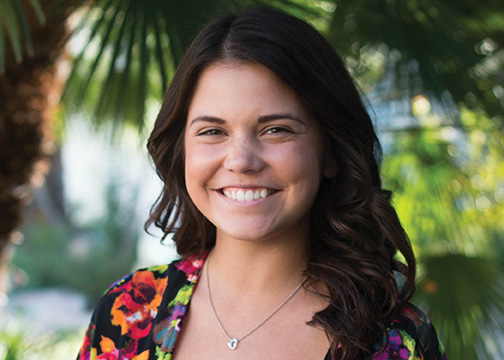The sophomore slump is a conceptual struggle that exists for a lot of San Diego State students — the whirlwind of freshman year comes to an end, and many wonder if life will ever feel the same again. For psychology sophomore Taylor Clark, this struggle is more than just a concept.
Clark was diagnosed with lupus in the beginning of September. She began to feel pain that she described as minimal only a month earlier, and chose to consult her doctor after it persisted and increased. Clark got the diagnosis unusually quickly — the combination of the positive results of two blood tests she took and the pain she was experiencing allowed her doctors to determine that she had lupus.
Lupus is an autoimmune disease with no known cure that can be defined by an overactive immune system. Autoantibodies attack healthy tissues and cause damage to many different parts of the body, which leads to pain and inflammation. According to the Lupus Foundation of America’s website, the disease generally affects women from ages 15 to 44.
Life has changed drastically for Clark since the onset of this disease. She previously lived an active lifestyle and was capable of accomplishing many tasks in a day, but now there are days where her pain is too severe to get out of bed. She must make sacrificial decisions every day.
“If I am going to get ready for my classes today, that might mean I don’t have energy to make myself dinner later,” Clark said. “You don’t know what the day’s going to bring, you don’t know how you’re going to feel, what you’ll be able to get done. It’s kind of hard to make plans.”
Some bigger decisions had to be made as well. Clark spoke with her family and her doctors about her status as a student and a resident advisor on campus, but rather than letting go of her job or leaving SDSU to go home to Northern California, she decided to stay.
“I have to be feeling productive, so I knew I wouldn’t like that. As nice as it would be to be home with my family, I just know staying home for a long period of time would just make me feel lazy,” Clark said.
Clark has had to make some changes, though. She uses Student Disability Services’ cart service to get to her classes, and her professors have been understanding of her situation enough to be more lenient regarding her attendance and the way she turns in assignments.
One of her favorite activities, spending a day at the beach, is now out of the question due to physical limitations and a medication that makes her sensitive to the sunlight. She cannot spend as much time with her friends as she would like because she has less energy to expend. As a result, Clark spends more time inside than she did before, and has found herself able to commit more time to her studies — and other indoor activities.
“I’ve developed a passion for Criminal Minds on Netflix,” she said with a laugh.
Having lupus has changed Clark’s outlook on life. She has learned not to make assumptions about people. She spoke of an incident in which a woman in car yelled at her for crossing the street too slowly.
“You don’t know what they’re going through and what’s affecting their behavior,” Clark said. “So I’m telling myself this as I’m getting mad at this lady for yelling at me. Maybe she has something going on with her too.”
Clark’s goals include graduating from SDSU and hopefully attending graduate school, which will aid her pursuit of a career in counseling psychology.
Clark has found the support of people in her life to be helpful throughout this experience, from the love of her parents to those who are understanding of her situation in her dorm. She has a webpage where she can share her story, as well as receive monetary donations to help with medical expenses and kind words that she feels have improved her attitude.
“You would be surprised how many people are willing to help or reach out to you,” she said.
By sharing her story, Clark hopes that those with good health will gain a new perspective and learn to view it as a luxury.
“You really don’t understand how good you have it until you don’t have it,” she said.









